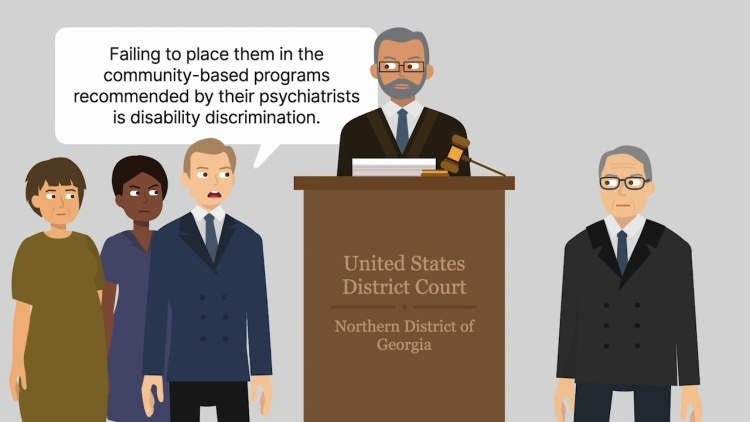Olmstead v. Zimring
United States Supreme Court
527 U.S. 581 (1999)
- Written by Nicole Gray , JD
Facts
L.C. and E.W. (plaintiffs) were disabled within the meaning of the Americans with Disabilities Act (ADA) due to mental impairments. The women were confined to state mental institutions in Georgia. However, the state’s mental-health professionals had determined that community-based treatment would be appropriate for both women, and neither objected. The women sued state officials in a United States district court, arguing that Title II of the ADA, which proscribes discrimination in the state’s provision of public services, required that they be placed in community settings rather than institutions. The district court granted summary judgment in favor of L.C. and E.W. after rejecting the state’s defenses that the women’s institutionalization was based on the state’s limited resources rather than on the women’s disabilities and that provision of community-based treatment would fundamentally alter the services the state could offer the women. The state appealed. A United States court of appeals affirmed the district court’s judgment, in part, after finding that undue institutionalization qualified as discrimination within the meaning of the ADA; however, it remanded the district court’s judgment for reconsideration of the state’s fundamental-alteration defense finding that the defense was available in limited circumstances when the state could prove that community-based treatment would place an unreasonable demand on the state’s mental-health budget. The state requested certiorari.
Rule of Law
Issue
Holding and Reasoning (Ginsburg, J.)
Concurrence (Kennedy, J)
What to do next…
Here's why 907,000 law students have relied on our case briefs:
- Written by law professors and practitioners, not other law students. 47,100 briefs, keyed to 996 casebooks. Top-notch customer support.
- The right amount of information, includes the facts, issues, rule of law, holding and reasoning, and any concurrences and dissents.
- Access in your classes, works on your mobile and tablet. Massive library of related video lessons and high quality multiple-choice questions.
- Easy to use, uniform format for every case brief. Written in plain English, not in legalese. Our briefs summarize and simplify; they don’t just repeat the court’s language.





